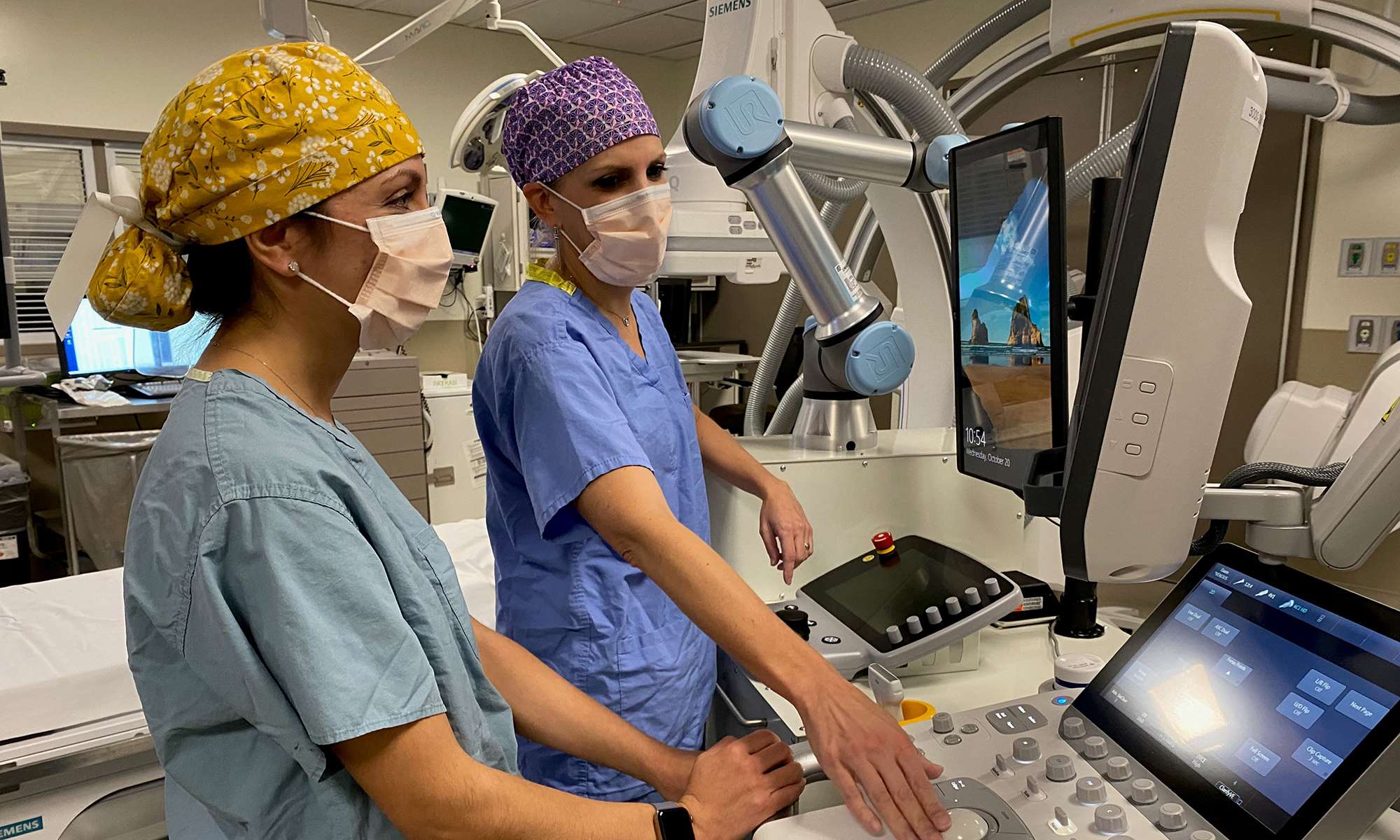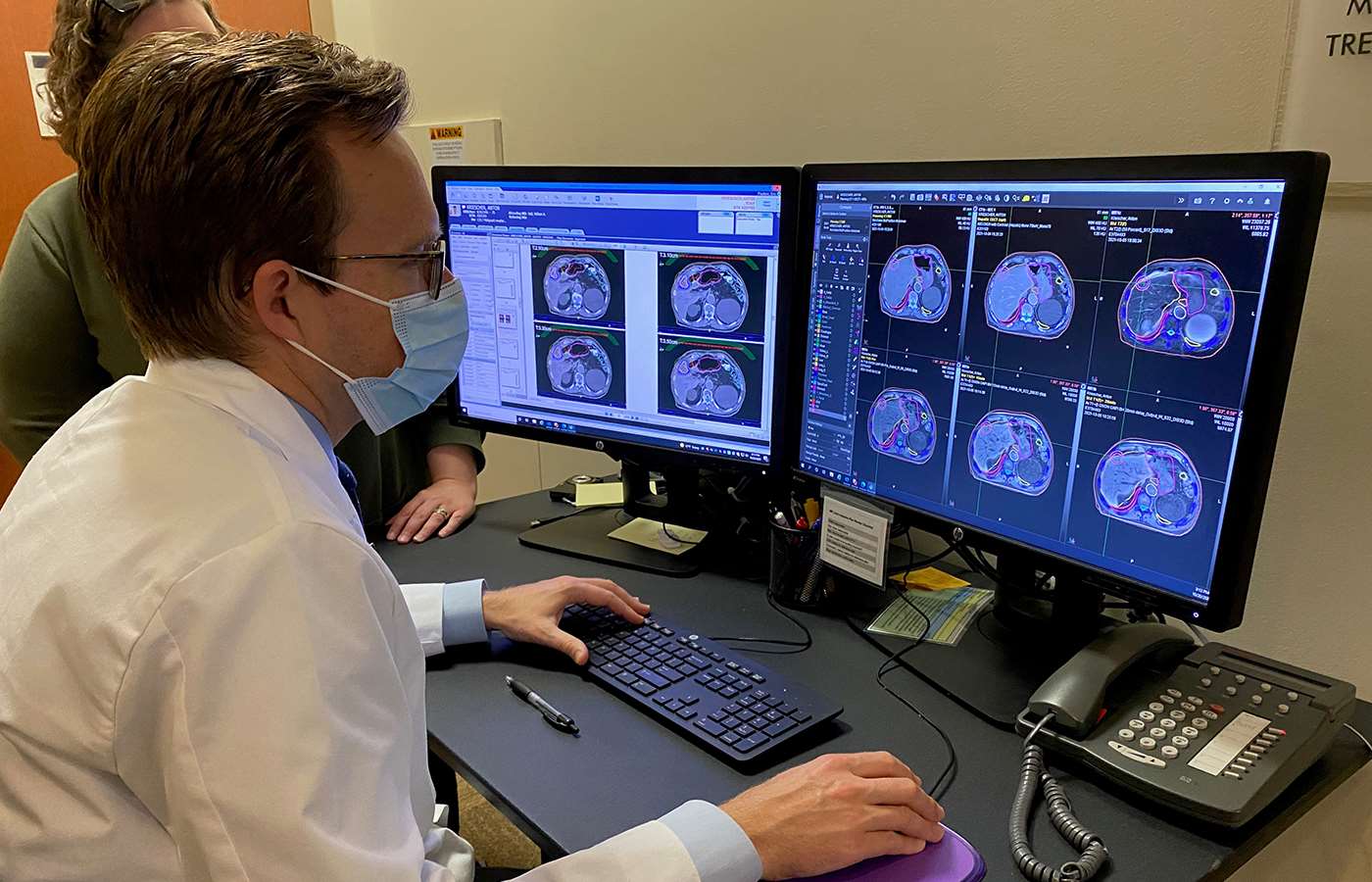Pushing the Boundaries of What's Possible

(l-r) Dr. Amanda Smolock and Dr. Sarah White are testing a combination of robotics and histotripsy – a technique that uses sound waves to liquefy and destroy cancer cells.
Every day, scientists and clinicians at the MCW Cancer Center are putting in the work to advance cancer discoveries and uncover new treatments that have significant potential for individuals with rare and aggressive cancers.
These individuals work together with teams of experts from disciplines across the Milwaukee Regional Medical Center and from other leading cancer centers designated by the National Cancer Institute. This collaborative approach pushes the boundaries of scientific discovery and exposes what’s possible in academic medicine.
MCW teams are advancing biomedical research, producing innovative cancer clinical trials and addressing cancer disparities to give every person a fighting chance to survive. They’re doing this with one collective aim – to eradicate cancer in Wisconsin and beyond.
Below are several MCW studies that are changing the landscape of what’s possible in cancer care.
Team Science Approach at MCW Builds MOMENTUM for Personalized Radiotherapy Treatments
Radiotherapy – or radiation therapy – is a common and effective cancer treatment used in approximately half of all patients with cancer. While it’s an indispensable tool in treatment, traditional radiotherapy has limitations, often when malignant tumors come close to healthy organs that could be damaged by exposure to radiation.
New advancements in radiotherapy technology are showing promise for safer and more effective cancer treatment. The Elekta Unity MR-linac – cutting-edge technology at the Froedtert & the Medical College of Wisconsin Clinical Cancer Center – enables doctors at Froedtert Hospital’s Milwaukee location to see tumor tissues more clearly, safely deliver higher doses of radiation and adapt the radiation dose to the precise needs of each patient. The Clinical Cancer Center is one of the only cancer centers in the US able to deliver this therapy.
Armed with this technology, MCW scientists and physicians are embarking in new research as part of an international cohort to study the outcomes of patients receiving radiation treatment around the world. “It’s a team science approach that brings together major cancer centers around a common cause to improve cancer treatment for patients,” says William A. Hall, MD, MCW associate professor of radiation oncology and surgery and one of the global principal investigators on the international MOMENTUM study (Multiple Outcome Evaluation of Radiation Therapy Using the MR-linac).
In this study, patients enroll in a registry and provide detailed feedback on their radiation treatment. This includes side effects and cancer outcomes. This project is creating a worldwide database accessible to physicians and researchers from any MOMENTUM institution. “By understanding what one patient is experiencing, we can tailor treatments for future patients to provide better care and more positive treatment outcomes,” says Dr. Hall.

Dr. William Hall is one of the principal investigators on the international MOMENTUM study.
Collaborative Cardio-Oncology Research Takes Holistic Look at Patient Care, Racial Disparity
While highly effective in the treatment of cancer, chemotherapy produces many side effects for patients. One potential side effect – cardiovascular disease – impacts some more than others.
To better understand the link between chemotherapy and heart disease, MCW set out to examine why Black and African American women are disproportionately affected by cardiovascular
complications after breast cancer compared to white women, and what medical providers can do to predict and prevent vascular damage.
Led by David Gutterman, MD, distinguished professor of cardiovascular sciences, professor of medicine and senior associate director of the MCW Cardiovascular Center, and Melinda Stolley, PhD, Ann E. Heil Professor in Cancer Research and associate director of the MCW Cancer Center, the transdisciplinary team includes researchers from both MCW and the University of Illinois Chicago. The team is studying the effect of cancer treatment on blood vessels and asking whether adding an exercise regimen during chemotherapy could produce
different results.
“We know exercise can improve cardiovascular fitness and quality of life among cancer patients undergoing treatments,” Dr. Stolley remarks. “However, most studies have predominantly
white patient samples and are not focused on assessing outcomes for women of color. Additionally, many of these same studies do not include long-term follow-up on patient response nor
look at the physiological pathways that link exercise to cardiovascular outcomes.”
Funded by a $2.7 million grant from the American Heart Association, the study underscores the power of team science – as well as MCW’s continued commitment to understanding and
improving cancer disparities. “The synergistic nature of this work will propel science forward, stretch how we think about cancer disparities and enable us to make faster progress toward closing these gaps,” Dr. Gutterman shares.
Noninvasive Technology Harnesses Sound Waves to Destroy Cancer Cells
MCW is participating in the first nationwide trial to study a noninvasive technology to treat liver cancer tumors. The trial, #HOPE4LIVER, is a collaborative effort with HistoSonics, a
medical device company that developed a novel robotic platform with potential to transform cancer treatments.
The technology, recently installed at the Froedtert & MCW Clinical Cancer Center, uses a combination of robotics and histotripsy – a technique that uses sound waves to liquefy and destroy cancer cells. It’s a first-of-its-kind, noninvasive alternative to surgery. “This technology is unlike any existing procedure and has the potential to revolutionize cancer therapy,” says Amanda Smolock, MD, PhD, MCW assistant professor of radiology, who is partnering with the study’s principal investigator, Sarah White, MD, MS, vice chair and professor of radiology and surgery (surgical oncology) at MCW.
MCW is one of a select few study sites across the country to take part in the #HOPE4LIVER trial, an example of how MCW continues to lead the way in taking breakthrough technology from bench to bedside. According to James Thomas, MD ’91, PhD ’89, MCW professor of medicine, associate director of the Cancer Center, “Our participation in this groundbreaking study is a demonstration of our commitment to advancing patient care by leaning into innovative therapies and extending our knowledge of what’s possible through research.”
Forging the Future of Cancer Immunotherapies
MCW Celebrates 20th Anniversary of Blood and Marrow Transplant Clinical Trials Network
Will Reach 50-Year Milestone for Center of International Blood and Marrow Transplant Research in 2022.
Twenty years ago, MCW received support from the National Institutes of Health to lead an effort to establish the Blood and Marrow Transplant Clinical Trials Network (BMT CTN) with the goal of translating impactful research in hematopoietic cell transplantation (HCT, a pillar of immunotherapy) into groundbreaking therapies to improve the lives of cancer patients across the country. Over the ensuing two decades, this network, which brings together leading cancer centers around the US, has launched more than 50 trials evaluating promising new therapies for blood disorders such as leukemia, lymphoma and multiple myeloma.
In 2022, MCW will celebrate 50 years as a global leader in HCT and cellular therapies, reflecting the creation of the Center for International Blood and Marrow Transplant Research – a research program with a database of more than 585,000 patients, a biorepository with specimens from more than 70,000 patients and a research staff of more than 200. This research collaboration between MCW and the National Marrow Donor Program/Be the Match continues to support the highest level of clinical, translational and health services research by scientists and physicians across the globe.
– Lee Dickert and Nikita Vilim



